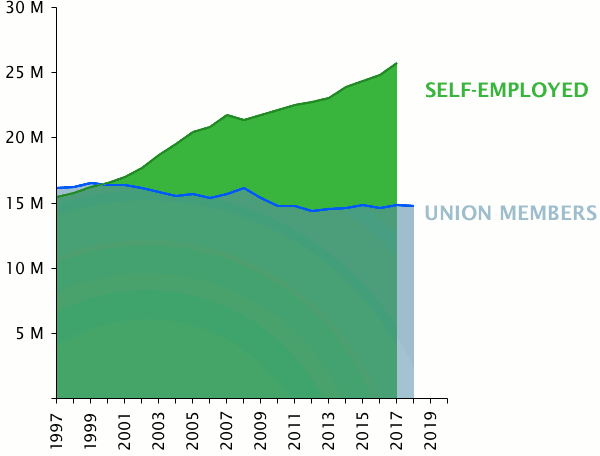
Veterinarian.
Photo © Julie Dermansky
Who Are the Self-Employed?
There are over twenty-five million self-employed Americans. They account for nearly 3/4 of American businesses, with over a trillion dollars in receipts. The labors of the self-employed are as old as agriculture, and as new as the gig economy. The self-employed cut across political party, age, sex, education, religion, creed and geography. They are the backbone of rural and local urban economies.
Because of the Self-Employment Tax, they are acutely aware of their identity as “self-employed,” but not of their large numbers and diversity in the United States. The self-employed are also the fastest growing and largest untapped voting block in the country. Their influence can easily swing future Congressional and Presidential Elections. Which candidate will call out to them by name and need?

By 2000, for the first time since well before passage of the National Labor Relations Act, nonfarm sole proprietorships outnumbered union membership.
From 1980 to 2014 nonfarm sole proprietorships doubled from about nine million to over 20 million, while union membership declined to less than 16 million. This hugely important change in the demographics of the American workplace must be recognized and acted upon by the Democratic Party, if it is to build a majority in Congress and win the Presidency. Democrats should point out that when the Reagan Administration attacked organized labor, it also attacked the self-employed by nearly doubling the Self-Employment Tax from 8.1% in 1980 to 15.3% in 1990, devastating the incomes of low and middle income self-employed businesses.
The political system of the United States is a Republic where professional lobbyists are key to interest groups being served by government. The self-employed have no such lobbying group of a scale that reflects their numbers. The best hope for the self-employed for representation is through politicians that see themselves as responding to the needs of citizens, and not by politicians waiting for a lobbying group that will deliver a candidate votes.
In a Republic, identity creates power. Consequently, the most important step in getting the self-employed to exercise their political clout, and thereby to defend themselves and their country, is to give the self-employed the welcome news that there are over 25 million of them, and to recognize the self-employed by name and need.

Carpenter, photographer.
Photo © Julie Dermansky
Unfortunately, the Democratic Party, like the Republican Party, has little recent history of supporting legislation that would help the self-employed. Federal, state and local governments have made the self-employed the highest taxed, most regulatory burdened, least protected citizens. Consequently, the majority of the self-employed are voting Republican in the hope that government will leave them alone. The self-employed are the backbone of rural America, and any change in the political direction of rural America will come about only when Democrats recognize and promote the importance of the self-employed to the rural economy.
Politicians indirectly refer to the self-employed as “small business,” but the term “small business” is code to the self-employed for being ignored. The Small Business Administration defines a “small business” in manufacturing as a firm with less than 500 employees, and its microloan program accounts for less than 1/2 of 1% of SBA loans.
If the Democratic Party wants to reach the self-employed, they must first use the name of this producer group: “self-employed.” If proposed economic plans do not refer exclusively to the self-employed, but include other small businesses, then Democrats should use this phrase: “small business and the self-employed.” Democracy in the Democratic Party must include the capitalism of the self-employed; the heart of local and rural economies.
The right to be one’s own boss is as fundamental to American freedom as the right to privacy or free speech. In a rural community, the self-employed may include a carpenter, farmer, lawyer, accountant, plumber, electrician, barber, fisherman, musician, masseuse, chiropractor, real estate agent, house painter, trucker, logger, excavator, stonecutter, artist, computer programmer, shopkeeper, photographer, herbalist, welder, mechanic or writer. The diverse lives and services of the self-employed need to be promoted, protected and championed by Democrats. If the Democratic Party chooses to be an advocate for the self-employed, it will win both Houses of Congress, and take back the Presidency.
“We say to you that you have made the definition of a business man too limited in its application. The man who is employed for wages is as much a business man as his employer; the attorney in a country town is as much a business man as the corporation counsel in a great metropolis; the merchant at the cross-roads store is as much a business man as the merchant of New York; the farmer who goes forth in the morning and toils all day, who begins in spring and toils all summer, and who by the application of brain and muscle to the natural resources of the country creates wealth, is as much a business man as the man who goes upon the Board of Trade and bets upon the price of grain . . . We come to speak of this broader class of business men . . .
“There are two ideas of government. There are those who believe that, if you will only legislate to make the well-to-do prosperous, their prosperity will leak through on those below. The Democratic idea, however, has been that if you legislate to make the masses prosperous, their prosperity will find its way up through every class which rests upon them . . .”
William Jennings Bryan, 1896
“Cross of Gold” Speech to the Democratic Presidential Convention